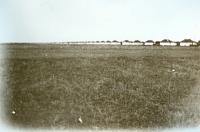Here is the place you will live; this will be your home! Take your things and organize it!
Born on 29 April 1945, Tudor Vladimirescu commune, Brăila county. His parents had fled from Bessarabia to Romania in 1940. Gheorghe Cotorbai‘s family first settled in Brăila county and then moved to Becicherecu Mic, near Timișoara. On the night of 17-18 June 1951, within a few hours, 44,000 people (from new-born infants to elderly people of eighty-five), from within a twenty-five-kilometre radius of the border with Yugoslavia, were taken from their homes, being allowed to take only as many possessions as would fit in a handcart, they were put on trains and taken to Bărăgan, an arid steppe in south-eastern Romania. They motive invoked by the authorities in Bucharest was the need to maintain security along the border with Yugoslavia (given tense relations with Tito). Those deported that night included the members of Gheorghe Cotorbai‘s family. He was six at the time. The Cotorbai family (two parents and three children) were allowed to take only a few possessions with them and like the other families they were loaded onto a cattle truck. The journey to Bărăgan lasted a week, with the deportees suffering from a lack of drinking water and the fear that they were being taken to Siberia. At Fundata in Bărăgan, one of eighteen newly founded settlements for the deportees, they were allocated an empty plot of land on which lucerne had been grown. On the very first day they were forced to build themselves a shelter without tools or building materials. First of all they built a shack and then began to excavate a hut from the ground. It was not until the autumn of 1951 that building materials arrived. However, priority was given to the construction of a school and town hall, and the deportees were able to build for themselves only in the free time remaining. Finding enough to eat was a daily challenge for the Bărăgan deportees, and even the children were forced to work. Gheorghe Cotorbai‘s saddest memories of his time in Bărăgan are connected with the compulsory labour on the state farms. When they were not at school, children of all ages were forced to take part in planting, harvesting, and tending crops of tomatoes, chives, onions, cotton and rice. The food they were given at work was scanty and inadequate, and their labour was remunerated only when they met the quota. After they had built themselves a house, his family remained in Bărăgan, as they had nowhere to go back to, all their goods having been confiscated. But Gheorghe Cotorbai went to Bucharest to continue his studies. However, his deportee file haunted him for many years, and he had difficulties entering lyceum and finding a job. He finally graduated from a lyceum, specialising in radiators, and worked in the heating sector. Gheorghe Cotorbai lives in Bucharest.
